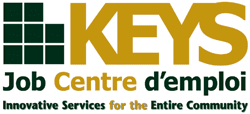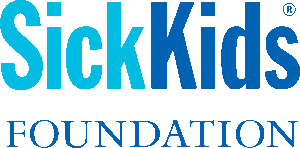KEYS Job Centre
Connecting to community through decent work: KEYS Job Centre – Kingston
Nonprofits seeking to develop decent work solutions for their organizations can start by looking at their home communities. For Michael Harris, executive director of Kingston-based KEYS Job Centre, the connections between organization, staff, and community were clear. “Decent work involves looking beyond just what we do within our organization; it relates to everyone that we connect,” he says.
Madeleine Nerenberg agrees. KEYS’ manager of newcomer services says that decent work extends throughout the organization and the broader community. “It’s not theoretical for us. It’s part of our everyday work with our clients, with the people that we serve, that drives us to engage and advocate pragmatic advocacy efforts.”
For example, Nerenberg points to her organization’s support for a living wage in the Kingston area, as well as developing a workplace inclusion charter, which aims “to create and promote safe spaces for marginalized populations.” It’s a good fit for the agency, as it seeks to do more than simply connect employers and job seekers. “We would love every employer to be offering a living wage and to be able to be offering the benefits and the leave that we do,” Nerenberg says. “But we also recognize that that’s just not the reality of the labor market that we’re in. So how can we kind of encourage things and support employers to take direction?”
Talking decent work with community employers
KEYS staff share decent work principles with employers in the community as a way to solve problems around retention or training. It might mean (gently) discussing how minimum wage combined with part-time positions can make it difficult to find and keep employees, but also finding opportunities to cooperate on creative solutions.
Nerenberg describes how the region’s hotel and tourism sector has found ways to attract and keep newcomers, many of whom were still learning English as a second language. “We were working with the employers not on wages, but on scheduling, on training, on accommodation, on mentoring in the workplace. The employers were highly motivated because they needed employees. And they’re very satisfied with the employees as a result of that work.”
Harris notes that KEYS’ outward advocacy is matched by ongoing internal reflection, too. The organization has reviewed and applied the decent work charter, for instance. “It’s not just that we’re reaching out to the community and to employers, but we ourselves are kind of looking at what more we can be doing.”
Engaging the broader community
For Harris, it’s important to seize the opportunity to talk about decent work when it arises. “Two years ago, we won the innovation award from the local chamber of commerce. I went up to receive the award and I used that opportunity in front of the gala. There were 300 people there – to hear the importance of being a living wage employer.” It’s an approach Harris would also like to bring to the organization’s funders, too. “We have a responsibility to advocate for decent work in the community on behalf of those that we serve,” he says. “I think there is work to do for funders to ask those questions of the bodies that they fund, particularly as they relate to employment services.”
KEYS has also partnered to build decent work solutions in the community. Harris highlights the organization’s membership in the Ontario Council of Agencies Serving Immigrants as an important channel for supporting decent work across the sector. The organization has also partnered on advocacy and awareness initiatives, Nerenberg says. “A few years ago, we had a project that was funded by the Law Foundation of Ontario, through a pro bono law student association. We delivered a series of workshops on employment standards, occupational health and safety, and immigration policy issues as they relate to work, especially for temporary migrants.” That work led to the creation of a comic book, translated into several languages, to provide a longer-term resource for workers.
Balancing challenging issues with “intentional lightness”
For Harris, the concept of decent work emerged through KEYS’ engagement with ONN’s work on the issue, along with the interests and experiences of the agency’s own staff. He credits staff who have experience in human rights advocacy for championing decent work, including bringing the charter and checklist to the agency and ensuring that they the staff are supported and the charter and checklist reviewed. “Our leadership team was open to decent work opportunities because it was so closely aligned with our values and then to see the actual tools, the Charter and Checklist that were available to us to assess what we could do and to improve on.”
Nerenberg also describes how the agency’s wellness group also takes on lighter-hearted, but no less important, tasks to sustain the culture of decent work. “We once closed down the street, and had Zumba [dancing] on the street. We also once closed out of the agency and we all got to watch a movie together and in the afternoon. We do those kinds of fun things.”
Nerenberg describes an attitude of “intentional lightness” as an essential part of decent work at KEYS. “ It’s only that in that place of lightness, that we can really be creative and innovative. ” Harris agrees. “I think it brings a balance. Some of the decent work issues we’re talking about can be challenging, heavy, difficult things.”
Building decent work, piece by piece:
Wages
Harris says KEYS provides a living wage (if not higher) with benefits, and looks to sector surveys to review their remuneration policies. “Our salary for our pay grade is decent. There may be similar positions in other employers that might pay more, but it’s certainly a living wage and comparable.”
Workplace flexibility
With the COVID pandemic, KEYS has adapted, like other nonprofits, offering greater scheduling flexibility for employees – many of whom can also work from home. “We have flexible work possibilities,” Harris says. “If staff have childcare responsibilities or other responsibilities, we’re willing to discuss changing work schedules.”
Vacation and leave
Harris describes KEYS’ leave and vacation policies as additional examples of the organization’s decent work culture. “Following probation, every employee is immediately entitled to four weeks of paid vacation per year, 18 paid sick leave days, five paid emergency leave days, as well as five paid personal days, which are very flexible in terms of the definition.”
Work-life balance
While staff are highly motivated and effective in their work, Harris says it’s also important to discourage working or checking email outside of scheduled work hours. “We want to encourage employees to keep boundaries around their work.”
Read more decent work case studies



